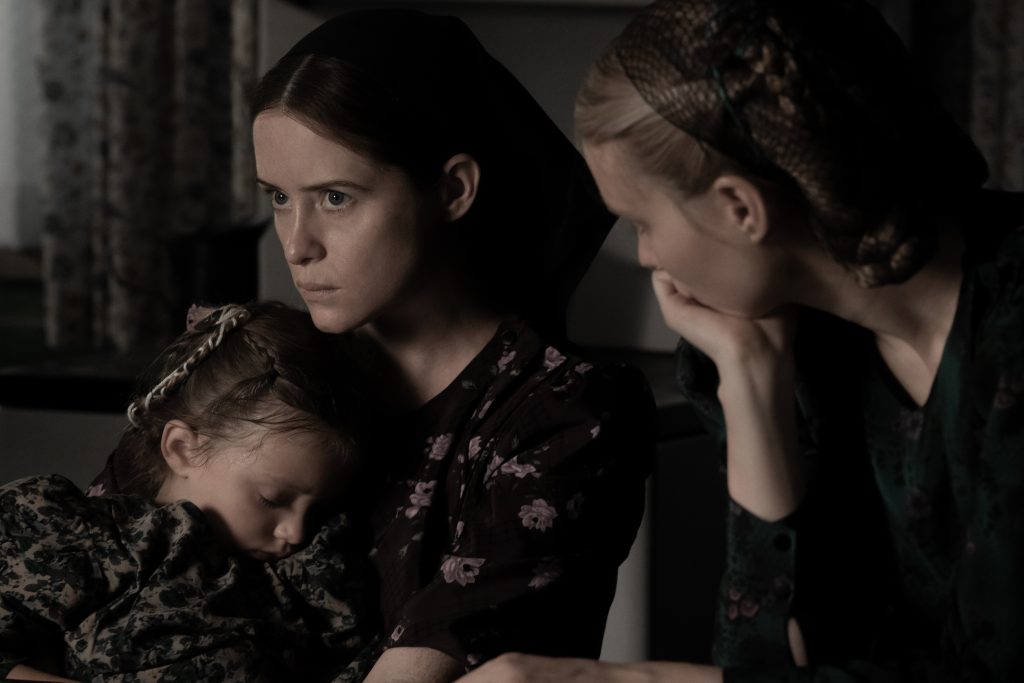
Directed by: Sarah Polley
Written by: Sarah Polley, based on the novel by Miriam Toews
Cast: Rooney Mara, Claire Foy, Jessie Buckley
Women Talking is a film adaptation of Miriam Toews’s work, who wrote her book as a reaction to real-life events that occurred while living in a Mennonite Community in Bolivia. Women Talking is deliberately ambiguous with its setting because, within this community, the women cannot read maps and at times cannot even think on their own.
Women Talking begins abruptly and lets its audience know exactly what kind of film it is. The film opens with a narration of what the women of this Mennonite community have been subjected to. Rooney Mara’s character, Ona is shown waking up in bed with her upper thighs bruised. She says “it happened again.” This scene leads into a montage of our characters realizing they have all been attacked while asleep. However, when the characters come forth about these attacks, they are led to believe that evil spirits are haunting and harming them.
They soon find out this is a lie conjured up by all the adult men of the colony. In retaliation, Salome (Foy) confronts the attackers with a sickle. As a result of this confrontation, the Townsmen hand over the accused men to the police. Soon after, all the townsmen travel to bail out the accused. The men state that upon their return the women must forgive the men or leave the colony. With a 48-hour time window, the women of the colony decide what they must do.
After this introduction Women Talking becomes a very dialogue-heavy film. Where I think Women Talking will suffer is that the movie rests on this decision (stay or leave) for the entire film. At many points, each decision is discussed so heavily even the characters in the film become bored. I view this as self-aware and necessary though. Often, hard discussions are pushed to the side because they are viewed as trite and boring. Each woman in the cast is there to embody a reaction that you would see in the present day when it comes to the film’s talking points (assault, religion, forgiveness, and expectations).
For example, Liv McNeil and Kate Hallett play Autje and Neitje. These two are the youngest involved in the discussion. At the beginning of the film, they shout “this is boring” and are seen playing around and braiding each other’s hair. Jessi Buckley plays Mariche who seems at times to side with no one and just wants things to not be discussed at all. In my opinion, the varying interest within the cast makes this dialogue-heavy film highly intriguing. However, I can see the subject matter causing some audiences to be put off.
In addition to being well written, Women Talking is shot beautifully. The film gives a variety of shots from long shots of the colony’s landscape to close-ups of characters and important items. These shots are really well-placed and give the audience a full understanding of the setting they are in. There also seems to be a choice made within the cinematography. Throughout the film, the audience does not see any of the adult men’s faces. Often they are shown out of focus or only from the neck down. I found this choice to be very intriguing and smart. Women Talking also totes impressive pacing giving the audience moments of sadness, laughter, and tension. I was truly unsure what would happen next despite knowing these women had two choices.
Early on in Women Talking a character exclaims to the group of women “Want Less.” I feel this film touches on that point in many ways. The cast is forced to grapple with if either of the decisions is an act of wanting too much. A point only further complicated by their devotion to the Mennonite religion. This ensemble cast is amazing. Each character genuinely delivers great performances.
Jessie Buckley plays a dramatically different character from the one she played in A24’s Men. Jessie Buckley is becoming an actress I would watch a movie just to see what role she plays and how she plays it.
Another standout is Sheila McCarthy as Greta. Greta often provides levity in the film both intentionally and unintentionally. Greta’s story throughout Women Talking is by far my favorite. Furthermore, Rooney Mara and Claire Foy hold their own very well and are often scene-stealers throughout the film. Rooney Mara plays Ona in a way that is both complex but very open. Every character seems to gravitate towards her, and it pulled me into the film’s narrative even more.
Claire Foy who plays Ona’s sister Salome is also a force. Often Salome drives the plot forward and seems to be the boldest and most respected of the group. This entire cast works well together and really elevates each other’s performances.
In summation, Women Talking has a clear point from start to finish. Whether that point is something the audience wants to hear is the one potential issue with the movie. While this movie may not be for everybody, I found myself fully enjoying it.



